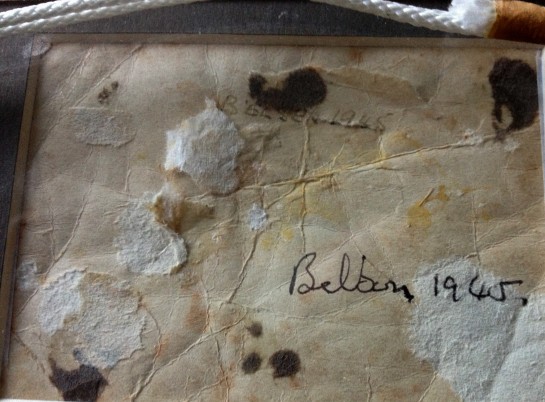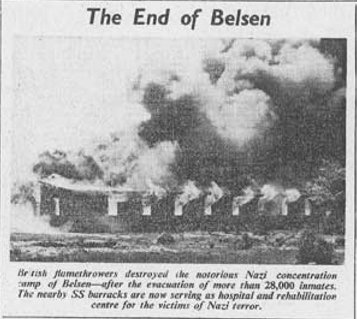Mentioned briefly in a footnote of my last post, here is a snapshot of one of my most treasured possessions.

This photograph, as the back says, was taken by my grandfather of the concentration camp at Belsen as it was burnt to the ground by the allies in ’45. My grandfather drove lorries in the war and I assume he was there to transport survivors away. I did ask him about it once as an older child and he told me that the Canadian soldiers who had liberated the camp, inadvertently caused several deaths by giving the starving survivors too much food, even a slice of toast could be lethal to their systems, so they ended up giving the inmates tiny, tiny squares of buttered toast at first. I do wish I could ask him about it now, as an adult, particularly his feelings about it, but I’m not sure he would have said very much more; his generation very often didn’t and I quite understand, it was a way of coping.


The picture is indeed priceless, Joe. The conversation below it is important too. Thanks for sharing it.
You’re welcome. Sadly, as a species the capacity to repeat this is in us still. Forewarned and all that jazz.
Hell, I didn’t even know my grandpa was in WWII until I was an adult. By the time I knew he had already moved to Florida. I was able to hear about how him and some buddies took a train from South Bend to Chicago to see a burlesque show when they were 16 years old. They got booted out of the club and headed over to the Chicago Theater where they saw some skinny kid from New Jersey named Frank Sinatra sing.
I talked to him more through email the last 10 years he was alive when he lived on the other side of the country than when he lived 45 minutes away. That generation was a distant and private one. I think the privacy of email allowed him to open up to me.
As far as what he did in Germany, he went over with the marines in 45′ to help liberate the concentration camps after the war was over. Can’t imagine the atrocities he saw.
Wow! That just sounds like the best night-out ever.
I just think it’s a shame so many stories have been lost to us, partly I think because a lot of that generation didn’t attach much value to their own stories too – it was their duty, just what they did.
Value to their own stories. I think you nailed it. They weren’t about sharing feelings. They were about getting on with it.
Personally I think that’s what we may have traded, in part at least for all our comparative prosperity and freedoms now, that general ability as a society to just knuckle down and carry on, carrying on.
You nailed it.
Kudos to you for keeping and cherishing and eventually passing along this piece of family history. While one could likely find dozens of similar photos from that same place and time, it will be the idea that “my g-g-grandfather was there and here’s the photo he personally snapped as proof and here’s the story as it’s been told to me” that will keep the memory real for those to whom you pass it along.
The question I have is, what with everything digitized nowadays and no one – including myself — writing longhand anymore, what physical stuff will our generation pass along? Er, maybe AC/DC shape discs with the colors run or autographed Devo LPs??
I agree totally, it’s that tie to history that makes things more piquant for families, learning about the First World War is one thing, but holding your GG-Grandfather’s service medal drives it home.
I miss letters, I used to write a lot of them – mostly blathering on about the music I’d just been listening to …
My granddad might have known your granddad – how strange. He was in charge of a fleet of lorries running fuel to the American and allied tanks. He was diverted to Belsen and helped transport the survivors. I’m sure there must have been hundreds of such troops, all telling their grandchildren the same story. I wonder if they ever met? My granddad was called George Carnell, and came from Treherbet, in the Rhonddah valley, South Wales.
It’s certainly possible, I don’t think my grandfather ever drove a tanker though, it was mostly food and other supplies, including baths for the frontline troops. His name was Reg Palmer and he was from Bridgwater in Somerset.
It fascinates me the way the war shook society up the way it did, all these people from different areas (different classes too) meeting up and moving around, I doubt whether my grandfather had ever left the West country before he was hoiked up to Yorkshire to do basic training at Catterick. It changed things.
I think that’s where my Granddad was stationed. He drove a truck, carrying ‘jerry cans’ not a tanker. Always under threat of being shot by Stukas and blown to bits. But yeah, my granddad never spoke of Belsen. It screwed his head up completely… as the war did for many. The slow creep of the far-right is upon us now. All across Europe and America… who would’ve thought we’d be facing this again?
I haven’t always understood that reticence. My grandfather, for example, was in Japan after WWII ended and would never talk about anything except baseball games. A little more understandable, our landlord in Germany would only talk about the mud in Russia and the skiing in France and bit what happened before/after. Whatever these folks experienced, I’m glad I didn’t and hope I never have to. Hopefully, no one gains such reasons for reticence.
I couldn’t agree more David.